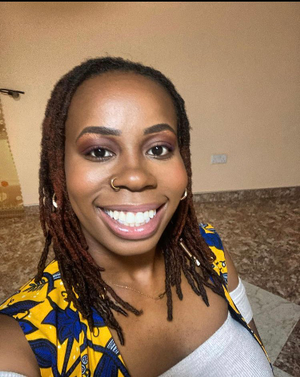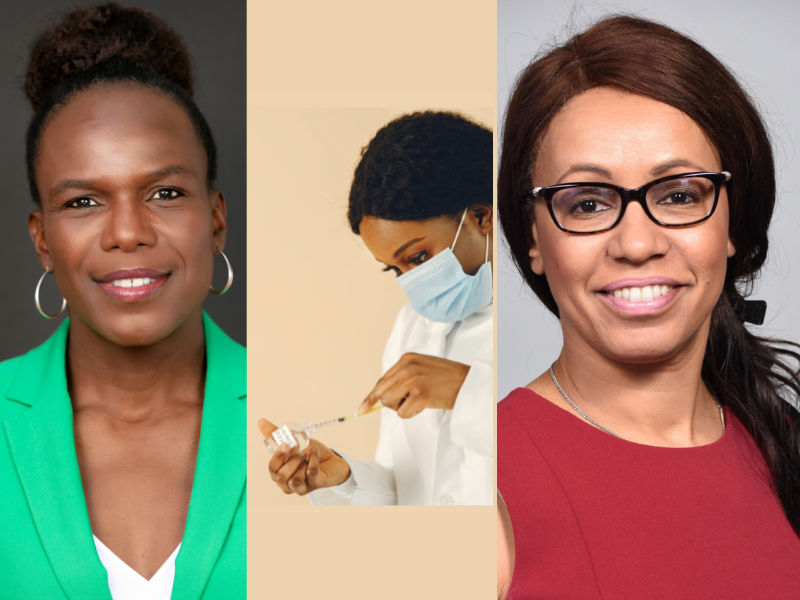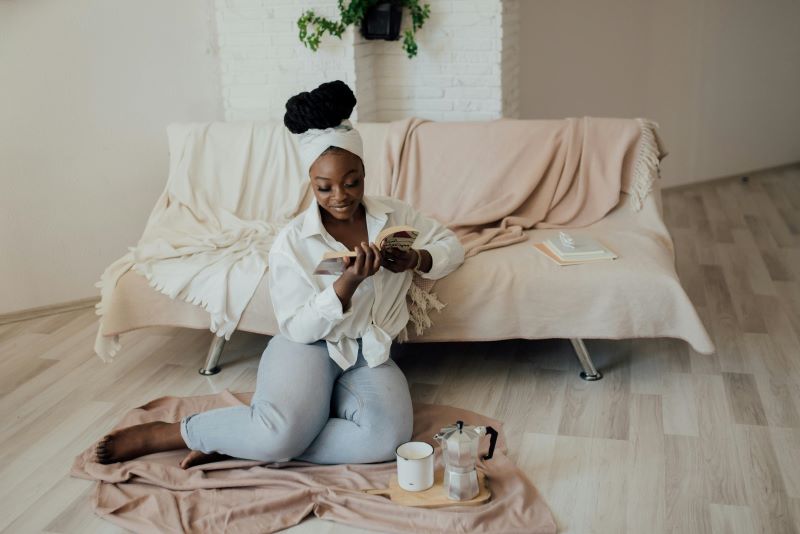Collage of doctors helping prevent COVID.
“The Black Doctors COVID-19 Consortium embarked on a massive vaccine campaign in Philadelphia’s at-risk Black and Brown communities. They didn’t wait for the communities to come to them, they rather went to the communities to test and vaccinate. This gesture improved trust and acceptance and removed barriers to vaccine acceptance. Trusted messengers are important in reducing the healthcare divide.” -Dr. Ngozi Onuoha, clinician, health educator, and FunTimes Magazine collaborating health partner, CEO, Health4Naija
‘Understanding COVID-19 Vaccine Hesitancy’ is a series that explores the backdrop of vaccine distrust among Black psyches in light of COVID-19. In the first part of the series, FunTimes engaged with medical professionals and historians to explore historical and cultural impacts on Black perceptions of vaccines and provided vaccine education to dispel myths among African-American and Afro-Caribbean communities. In this article, the second part of the series, FunTimes explores the impact of the Black Doctors Consortium’s COVID-19 vaccine outreach to Black Philadelphian communities, to uncover replicable outreach strategies of providing vaccine and healthcare access to underserved communities.

( Dr. Ala Stanford. Image by Saleen Saleh via Wikipedia Commons )
The Black Doctors Consortium (BDC), formerly known as the Black Doctors COVID-19 Consortium (BDCC), was created in 2020 by pediatric surgeon Dr. Ala Stanford, with the goal of reducing COVID-19 related deaths and infections among African-American communities through advocacy and education. Dr. Stanford, a North Philadelphia native, heard about the COVID-related racial disparities and miseducation and utilized a grassroots approach of providing COVID-19 testing and vaccination access to Black underserved communities. She went directly to underserved communities to provide free testing, mobilized a network of Black doctors and allies in Philadelphia, and collaborated with churches and other community organizations to set up COVID-19 vaccination and testing centers in Philly’s most vulnerable Black populated areas.

( People at a church getting ready to be vaccinated. Image by MDGovpics via Wikimedia Commons )
Through other collaborative initiatives like Philly Teen Vaxx, which included recruiting high school ambassadors to educate their peers and host vaccination events, and Philly Vax-Jawn 1&2 events, which included vaccination clinics and social activities like double dutch, music, water ice, and more, BDC utilized a multifaceted approach of incorporating cultural practices and trusted messengers to dispel vaccination myths and provide vaccination access.
The BDC’s outreach and the impact resulted in Philadelphia having the highest percentage of Black vaccinated population out of America’s top 10 Black cities in October 2021, at 54%, as stated by Bloomberg. As of January 10th, according to the Kaiser Family Foundation (KFF), Pennsylvania is one of the states with the most vaccinated Black populations, at 70%. Through their efforts and nationwide exposure, the Black Doctor’s COVID-19 Consortium (BDCC) was able to garner enough support to expand its services to offer primary care for underserved communities, changing its name to the Black Doctor’s Consortium (BDC).
In October 2021, the BDC opened the Ala Stanford Center for Health Equity (ASHE) in Swampoodle, an underserved community in the Allegheny West section of North Philadelphia. ASHE provides behavioral health, social service, and preventive care services to both the insured and uninsured, with services offered on a sliding scale for the latter.

( Dr. Ngozi Onuoha, clinician, health educator and collaborating health advocate of Health4Naija )
Dr. Ngozi Onuoha, a clinician, health educator, and collaborating health advocate of Health4Naija, discusses the history of how COVID-19 vaccines were developed:
“Researchers and scientists worked hard to make the COVID-19 vaccines, utilizing knowledge that has been available since the first smallpox vaccine in the 1700s, coupled with more recent mRNA medical advances that have been studied for the last 30 years.”
In discussing the vaccine outreach strategies utilized by the Black Doctors COVID-19 Consortium to reach Black communities and replicable lessons for health institutions, Dr. Onuoha says:
“The Black Doctors COVID-19 Consortium embarked on a massive vaccine campaign in Philadelphia’s at-risk minority in Black and Brown communities.They didn’t wait for the communities to come to them, they rather went to the communities to test and vaccinate. This gesture improved trust and acceptance, and removed the barriers to vaccine acceptance. Trusted messengers are important in reducing the healthcare divide.”
Dr. Onuoha describes the importance of vaccines in light of the new variants like omicron and IHU, and what the emergence of other variants mean for the population:
“There are reports of many variants of the novel coronavirus, but not all the variants are threatening, and some of the variants do not thrive to become dangerous. Viruses are very clever and change frequently. We see this with the influenza virus, and that is why a yearly flu shot is given. Last year’s flu strain will not be this year’s flu strain, so new flu vaccines are made yearly.
This is a similar concept to the novel coronavirus. So, booster doses will be needed to combat new virulent strains until the virus fades. We are hoping the COVID-19 pandemic will fade just like the Spanish flu pandemic of 1918, which lasted a few years.”
In discussing the possibility of herd immunity becoming a reality in the near future, and the role of vaccines in creating herd immunity, Dr. Onuoha says:
“Herd immunity occurs when the majority of the population is immune to an infection, such that the infection does not spread from person to person as much. I hope we will reach herd immunity with the ongoing vaccine campaigns and education. People who have held off on getting the COVID-19 vaccine are starting to accept the vaccine as a new normal. COVID-19 vaccines provide longer-lasting immunity compared with immunity from COVID-19 infection. So, the vaccines are important for herd immunity.”
Dr. Onuoha discusses the history and possible future of vaccines:
“Pandemics occur about every 100 years because viruses evolve over time. We should adapt to the change that the pandemic has created, and this includes accepting the COVID-19 vaccine, taking exposure precautions, and emerging COVID-19 treatment.
Generations that follow will view SARS-CoV-2 virus as the norm and vaccinations will be routinely given like other vaccines such as measles, hepatitis, and tetanus vaccines.”
Global healthcare institutions and caring providers who work to provide vaccination access and education may achieve success through organizing, utilizing a grassroots approach of bringing vaccination access to underserved communities, crowdfunding, involving community members as trusted messengers to educate the masses, incorporating cultural practices into vaccination events for target communities and forming partnerships with community organizations. Black and Brown doctors who are moved to form coalitions may garner support through their efforts, and may even be empowered to found their own healthcare facilities.
Stay tuned for the final and third part of ‘Understanding COVID-19 Vaccine Hesitancy’, where we speak to respondents and interviewees in the Greater Philadelphia region and beyond to learn about COVID-19 vaccination experiences and opinions.
Works Cited
https://www.fox29.com/video/935613
https://www.cbsnews.com/news/teen-vaccine-ambassadors-covid-vaccine
https://www.pewtrusts.org/-/media/assets/2018/09/phillypovertyreport2018.pdf
This article has been made possible by the Independence Public Media Foundation.


Nana Ama Addo is a writer, multimedia strategist, film director, and storytelling artist. She graduated with a BA in Africana Studies from the College of Wooster, and has studied at the University of Ghana and Kwame Nkrumah University of Science and Technology. Nana Ama tells stories of entrepreneurship and Ghana repatriation at her brand, Asiedua’s Imprint ( www.asieduasimprint.com ).





